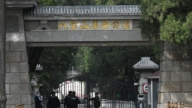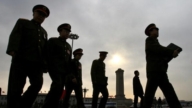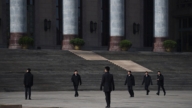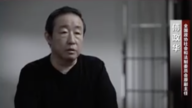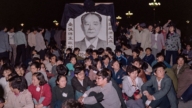【新唐人2013年01月04日讯】2012年,中共从地方党委到中央委员会的大换届,换得惊心动魄。而在踏入2013年的首季,又有从地方人大到全国人大的换届。有评论认为,今天的中国,公民意识抬头, 中共为巩固自己的执政地位,新领导层还需要获取最大的民意支持,因此, 中共的换届工程既要合党心,又要顺民意,再加上党员干部全面和深度的腐败,中共的“换届”有它的难度。
据了解,中共“十八大”的人事布局共有三波:继七名政治局常委亮相之后,地方的所谓“一把手”也相继大换班;接下来,中央机构和国务院部委领导的换届,将在3月的“两会”后完成。
攸关中国“政府部门”换届交班的“全国人民代表大会第一次会议”,将于3月5号在北京召开。会议将选出新的国家主席和副主席、以及国家中央军委主席,并决定国务院总理等政府组成人员;而省级人大会议将决定省级政府的重组。
国务院预料仍是团派天下。李克强铁定当总理,汪洋及刘延东担任副总理。无一例外的还有,中国共产党的那些领导,再次成为中央政府的领导,和地方上各级政府的领导。
美国《世界日报》新闻网站的社论指出,到目前为止,中共最大的政治任务,仍是巩固自己的执政地位,所以从中央到省级地方,关键职位全部由中共中央委员、中央候补委员出任。
时政评论家孟渊沛指出,中共一贯“党决定一切”,所以每次换届,都在贯彻执行这么一个惯例。
时政评论家孟渊沛:“所谓的两会:人民代表大会、政协会议,基本上就是落实十八大的意图,比方说政治局常委已经选好了,这里边有一个人会担任人大委员长,在政协会上会担任政协主席,就是俞正声,他们说,人大的委员长可能是张德江。他们两个都是政治局常委。人家这个党决定好了,它就马上……他的人大班子、政协的班子、国务院的班子,国务院总理可能是李克强,这些班子就规划好了。”
孟渊沛认为,新的一年,中共当局仍然没有任何政治体制改革的迹象。
孟渊沛:“就是它明天死的话,今天也不会改,就会按照它的这样一个很腐朽的、没落的体制继续运转,因为这样做下去,它才能感觉到避免马上会死,所以就是说:没新意,只能是加剧它死亡。”
《世界新闻网》评论,今天的中国,虽然还没有成为民主社会,但已进入公民社会,社会思想意识已多元化。当局对民意的掌握,成为所谓“最大短板”。又由于中国从政治、经济上,都已步到转捩关口,新领导层需要获取最大的民意支持,于是“换届工程”既要合党心,又要顺民意,是为最大难点。
社论说,中共“换届”的内在恐惧和深层难度,“来自执政党中共自身,那就是党员干部的全面和深度的腐败。中共十八大的经验证明,既然作为中共中央政治局常委、政治局委员的人选,都可以是极度腐败份子,还有什么事不可能呢。”
时事评论员 蓝述:“明年有可能出现什么意外呢?现在是一个资讯非常发达的时代,中共目前上上下下官员都腐败的不得了,民众可以上网去公开他们所知道的这些中共领导人的腐败行为,一旦公开之后,最有可能发生的就是:各个利益集团之间,通过打击与自己利益集团有矛盾的其他利益集团的候选人,而引起中共政局的不稳,这是最有可能发生的事情,也是中共最害怕看到的事情。”
时事评论员蓝述还表示,这里面体现两个利益冲突,一个是中共腐败与民众要求保护自己权益之间的利益冲突, 同时,在不民主的制度之下,中共党内还有不同利益集团之间的利益斗争,这两个利益斗争交错在一起,很可能带来换届过程中的政局不稳。
采访/陈汉 编辑/周平 后制/萧宇
Headache for Beijing Regime’s Leadership Change in 2013
2012 saw local and central leadership changes
within the Chinese Communist Party (CCP) regime.
In March 2013, a power transition will be held
for CCP’s local and national people’s congress.
Commentators say that the rise of civic consciousness in
China has forced new CCP leaders to gain pubic support.
However, the regime is facing difficulties.
This is because its “power handover project” has
to satisfy both the Party and the general public.
In addition, it faces the reality of
full-scale and deep official corruption.
There are three tiers for new leadership changes for the
CCP’s 18th Party Congress, according to news reports.
The first tier is the seven top politburo leadership team.
The second is that of regional CCP Party chiefs.
The third is of leaders in CCP central agencies
and, in the State Council ministries.
The third tier handover will be completed right
after the CCP “Two Sessions” in March 2013.
The first session of the CCP National People’s
Congress will be held on March 5, 2013 in Bejing.
The meeting will select the Peoples Republic
of China’s new President, Vice President,
and head of the Central Military Commission.
It will also finalize the CCP regime’s new
Premier and government leadership.
CCP Provincial People’s Congress
will also appoint local authorities.
The CCP Youth League faction is expected to retain
a majority of seats in the new State Council leadership.
Li Keqiang is deemed to be the Party’s next premier.
Wang Yang and Liu Yandong will become vice premiers.
Without exception, all CCP central and regional
authorities will be under the lead of CCP leaders.
An editorial published on ‘worldjournal.com’ said that
the CCP’s priority political task is still to cement its helm.
Thus, key positions in CCP central and local
authorities are all filled by members and
alternate members of the CCP Central Committee.
Political critic Meng Yuanpei indicates that the CCP
always holds that “the Party has the final say.”
This convention is just followed in every
generation of its power transition.
Meng Yuanpei: “The CCP two sessions
is referred to the National People’s Congress
and People’s Political Consultative Conference.
Both are held primarily for the implementation
of the aims proposed at the 18th Party Congress.
For example, one of the new CCP Politburo
Standing Committee members will serve
as head of National People’s Congress.
Another will be chairman of the
Political Consultative Conference.
It is said that Zhang Dejiang and Yu Zhengsheng
have been slated to fill the role, respectively.
Both are members of CCP Politburo Standing Committee.
The Party has finalized the to-be leaders in the
National People’s Congress, People’s Political
Consultative Conference, and in its State Council.
Li Keqiang is expected to be next Premier.”
Meng Yuanpei says that entering a new year, the CCP
regime shows no sign of implementing political reform.
Meng Yuanpei : “It won’t be changed
even at the last minute.
It will remain in operation by following
its rotten and decaying mechanism.
This makes it feel that it won’t collapse right away.
In short, it won’t come up with new ideas, but the
further operation will only accelerate its demise.”
‘Worldjournal.com’ commented that today’s China has
become a civil society, with diversified social ideology.
It said that the CCP authorities’ control over public
opinion is the limiting factor that weakens it most.
China has come to a turning point
in both politics and economics.
Its new leadership needs to gain great popular support.
The biggest difficulty for the CCP “leadership handover
project” is how to satisfy both the Party and general public.
The editorial stated that the inner fear and underlying
difficulty is “derived from the ruling party itself.”
“That is, the Party members’ are deeply corrupt.”
“The CCP 18th congress has proved that
candidates for the Politburo Standing Committee
and for the Politburo can be extreme corrupt.”
“In this case, anything can happen in the future.”
Critic Lan Shu: “Will any unexpected things happen in 2013?
Now we’re living in a very well-developed information era.
The CCP officialdom is filled with corruption, but
civilians can disclose officials scandals on the internet.
Once it’s publicly exposed, the most likely to occur is
attacks against candidates from conflicting interest groups.
This will trigger CCP regime instability, and is most
likely to occur, and is what the CCP fears most."
Lan Shu adds that there’re two
conflicts of interests involved.
One is between CCP corruption and the
public defending their own rights and interests.
The other is infighting among different
CCP factions or interest groups.
These two struggles to gain interests are
intertwined, which is likely to cause the CCP
regime instability during its power transition.


